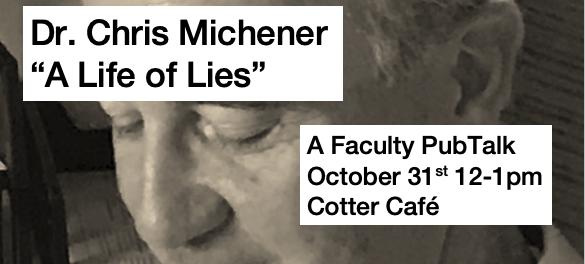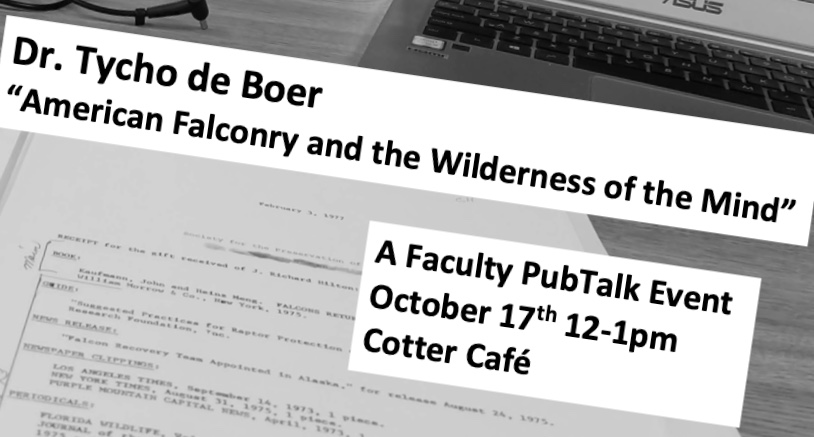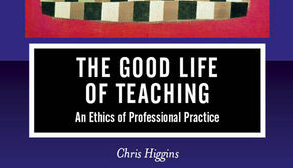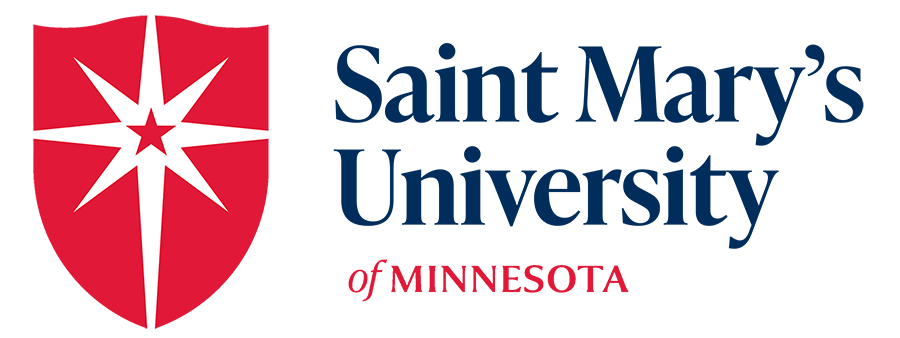News

PubTalk: “A Life of Lies” with Chris Michener
Join us November 7th at noon in Cotter Café for the next Faculty PubTalk: Chris Michener’s “A Life of Lies”. Dr. Michener says “fiction, in essence, is a lie. An author relates a series of events that did not actually happen—except in his or her imagination. Readers, then, willingly suspend their disbelief.”He will reflect on his own experience in telling such lies. What draws him to the act of fiction making? How does he come to tell the stories? How does it affect who he is? What is it like to live a life of lies? Add the event to your Google Calendar using this link: 
Faculty Pub is about supporting faculty who are working on writing projects and the PubTalk series embodies this with faculty who talk about their writing progress, process, and results. And the talks will generally be short with lots of opportunities for discussion. Refreshments will include Pumpkin Spice Cheesecake Muffins and Cranberry bars.

Leadership Activities in the Classroom
Saint Marys’ mission states that we prepare students for lives of ethical service and leadership, and in the Leadership PLC the last few semesters, Dr. Scott Sorvaag has been guiding us in thinking about how we use and interpret leadership in higher education. (One of his continual reminders is that leadership is a form of energy — hence the picture for this post.) As part of our PLC, we reviewed some offerings by the International Leadership Association, including this list of Leadership Activities one can include in virtually any class.
And at this point in the semester, you might just be looking for something exciting to throw into a lesson here or there. So take a look. Here are just two examples:
- Students work in groups and each locate a leader within a certain leadership theory and write a group paper over the leader(s), the theory, and how the leaders led through that theory.
- Students get 100 votes to assign to various options to addressing a topic (say, what the university can do to improve the experience of first year students). They get to assign those votes to the options as they see fit. Do it once with individuals and once with perfectly transparent voting.
 “Ashcott : Ashcott Farm Solar Panel” by Lewis Clarke is licensed under CC BY-SA 2.0
“Ashcott : Ashcott Farm Solar Panel” by Lewis Clarke is licensed under CC BY-SA 2.0

The kinds of questions that make a great midterm evaluation
Whenever I advise someone on assessment, I always start with the question, “What do you want to know?” The same question makes a lot of sense when thinking about course evaluations and midterm evaluations. While most instructors don’t have control over final course evaluations (I suppose the idea is that the questions asked are what administrators want to know), we by and large do have control over the questions we ask on midterm evaluations. Richard Talbert, chair of mathematics at Grand Valley State University in Michigan, writes about getting dynamic student feedback through a five-question summary with an elaborate system for tracking student perceptions over a whole course, But the questions he uses would be great for any kind of mid-course check-up. The statements he asks students to reflect on are:
- I was challenged intellectually by the content and activities this week.
- I had plenty of support from the professor, my classmates, and the course tools as I worked this week.
- I am closer to mastering the ideas of the course now than I was at the beginning of the week.
- I made progress in learning this week because of my own efforts and choices.
- I felt I was part of a community of learners this week.
He describe the way he uses these questions each week, including Python code and graphs, and the whole post is worth reading. But I was intrigued by the reasons he uses these five questions. The first two he asks to make sure he has the right balance between challenge and support in his classes. The last three he asks to see how the students are progressing on being self-determined learners in his class, based on Self-Determination Theory. I think both of these targets are excellent ones for midterm evaluations, and do a lot better than going for a broader survey. When one has developed some principles behind a teaching practice, it makes sense to concentrate on those rather than simply trying to get a preview of what course evaluations might look like at the end of the term if your instruction doesn’t change.
“why do humans q”by meadowsaffron is licensed under CC BY-NC-SA 2.0

PubTalk: American Falconry and the Wilderness of the Mind by Tycho de Boer
Join us on October 17th at noon in Cotter Café for our first Faculty Pub “PubTalk”. Faculty Pub is about supporting faculty who are working on writing projects and the PubTalk series embodies this with faculty who talk about their writing progress, process, and results. And the talks will generally be short with lots of opportunities for discussion. For the first PubTalk, we thought we’d start with the most interesting possible topic: killer birds. So come see Dr. Tycho de Boer from history give a talk called, “American Falconry and the Wilderness of the Mind”. Add the event to your Google Calendar using this link: 
What does the “backstage” part of the writing and publishing process look like for your colleagues? Come to PubTalks and you’ll get a pretty good idea. Also, we’ve heard there will be doughnuts…
Edit: Tycho wants those attending the PubTalk to have access to his draft preface. [Download]

Towards a Pedagogy of Kindness
One of my friends recently linked to this article in Hybrid Pedagogy (an open-access teaching and learning journal) about Distinguished Professor of American History Dr. Cate Denial’s journey to what she calls a “pedagogy of kindness”.
The article is about transitioning from a gatekeeping approach to a discipline where one looks for ways of penalizing non-compliant students to an approach that takes seriously student struggles with integrating life and learning. She found it to be a more compassionate approach that was more true to who she was as a person.
Some of the changes she made to her teaching included:
- Believing students when they tell her that life events interrupted their ability to be in her class
- Building student ownership in her courses by crafting a syllabus after asking students questions about the topics they’d be covering
- Building consensus with her classes about what constituted a “meaningful assignment”
- Offering additional options for students with and without disabilities to engage with her course in the spirit of universal design for learning.
I highly recommend the article if you think prioritizing kindness might help your teaching break through to your students and get beyond a transactional model of education.
“Key deer fawn and doe”by alumroot is licensed under CC BY-NC 2.0

What we’re reading: The Good Life of Teaching
This book is a deep dive into how teaching can contribute to the good life of a teacher, and not just his or her students. It is also one of the texts we will be tackling in the Character and Virtue PLC this term.
Christopher Higgins of the University of Illinois, Urbana-Champaign is a philosopher of education and it shows in this book. He starts by giving a short history of why some philosophers believe modern ethical theories don’t make enough room for the individual projects of people living meaningful lives and then sets his sights on applying these insights to teaching — particularly in higher education. Along the way he gives a good explanation of virtue ethics and expands on the vital role of a word that we use a lot in CELT: a practice. Practices are activities that we undertake, socially, that have a kind of built-in reward for those who work on improving their participation in the practice. Teaching, he argues, is an important practice and thus must be understood as something more than selfless devotion to the good of one’s students.
There is a lot of philosophy here, but the book is also a good foundation for understanding why burn-out is so common among faculty in higher education and what kind of steps one can take in one’s own teaching practice to rediscover some of the joys that attracted us to teaching in the first place.

On the Radar (Instructional Technology Links)
- Technology In The Classroom: The Question Is Not “If” But “How” by Linda Darling-Hammond. Forbes Magazine
- Small Changes in Teaching: The First 5 Minutes of Class. The Chronicle of Higher Education
- A conversation about Active Learning Classrooms (ALC). Teach Better Podcast
- Story Maps and Digital Humanities
- A new phrase I learned over the summer is “Intelligent Disobedience.” I’m debating if it will apply to this new style change: APA Style Guide Endorses 1-Space Rule.
“Radar”by Dave Pearson is licensed under CC BY-NC-ND 2.0
